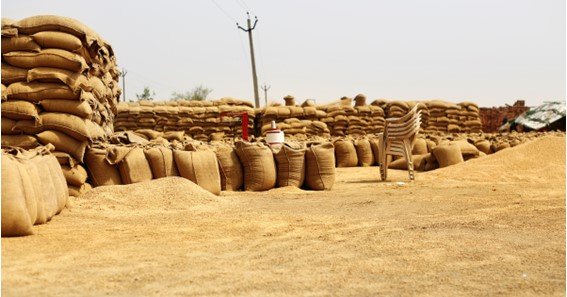Buffer stock refers to a reserve of essential goods, such as food grains or raw materials, held by governments or organizations to stabilize market prices and ensure steady supply during times of market volatility. Buffer stock plays a crucial role in preventing price spikes and shortages, especially for essential commodities, by releasing surplus stock when demand exceeds supply and purchasing surplus during periods of excess production.
How Buffer Stock Stabilizes Markets
- Price Stabilization: Buffer stocks help maintain stable prices by regulating supply. When there is excess production, the government buys and stores the surplus, preventing prices from falling too low. During shortages, stored goods are released to prevent price spikes. This helps ensure affordability for consumers, particularly for essential goods like food grains.
- Mitigating Supply Shocks: Natural disasters, political instability, or supply chain disruptions can lead to temporary shortages. Buffer stocks serve as a safeguard, ensuring consistent availability of goods and preventing sudden price surges during such crises.
- Promoting Food Security: In agriculture, buffer stock is essential to ensure food security. By maintaining reserves of staple crops, governments can intervene during periods of scarcity to prevent hunger and keep prices stable, which is particularly important for developing economies.
- Economic Stability: By stabilizing the prices of essential commodities, buffer stock also contributes to overall economic stability. It prevents inflation caused by rising prices and deflation from oversupply, ensuring a balanced and predictable market environment.

Conclusion
Buffer stock is a vital tool in maintaining market stability, mitigating supply shocks, and supporting food security. Its role is essential not only for the agricultural sector but also for industries reliant on stable supply chains.
FAQ
What is buffer stock?
Buffer stock refers to a reserve of essential goods maintained by governments or organizations to stabilize prices and ensure availability during supply fluctuations.
Why is buffer stock important?
It stabilizes market prices, ensures food security, and protects against supply chain disruptions during times of scarcity or oversupply.
How does buffer stock help in agriculture?
It ensures that farmers receive fair prices during times of surplus production and helps stabilize food prices during shortages, preventing hunger and economic distress.
What are the challenges of managing buffer stock?
Managing buffer stock can be costly due to storage expenses, risks of spoilage, and the difficulty in predicting market conditions for effective intervention.
Can buffer stock be used in industries other than agriculture?
Yes, industries like oil, metals, and manufacturing also use buffer stocks to ensure smooth production and mitigate the risks of supply shortages or price volatility.










